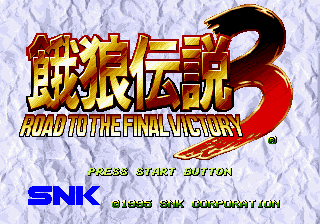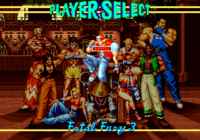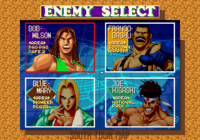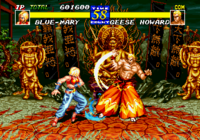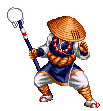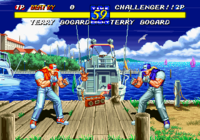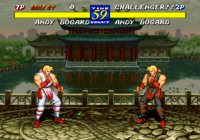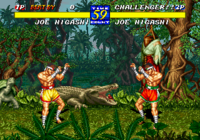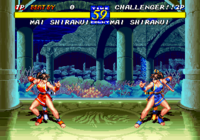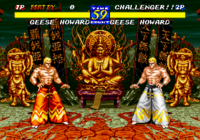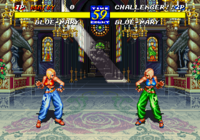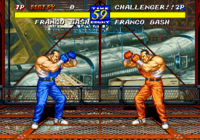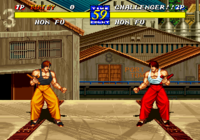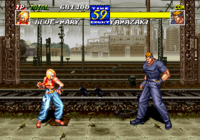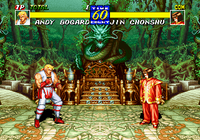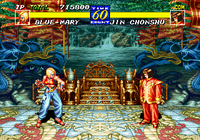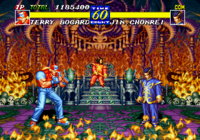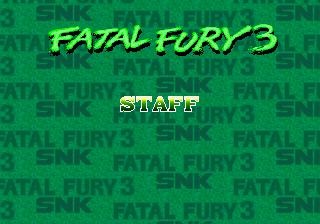Garou Densetsu 3: Road to the Final Victory
From Sega Retro
| Garou Densetsu 3: Road to the Final Victory | ||||||||||
|---|---|---|---|---|---|---|---|---|---|---|
| System(s): Sega Saturn | ||||||||||
| Publisher: SNK | ||||||||||
| Developer: SIMS | ||||||||||
| Original system(s): Neo Geo | ||||||||||
| Developer(s) of original games: SNK | ||||||||||
| Sound driver: SCSP/CD-DA (50 tracks) | ||||||||||
| Genre: Fighting Action/Kakutou Action (格闘アクション)[1], Action[2] | ||||||||||
| Number of players: 1-2 | ||||||||||
| ||||||||||
|
Garou Densetsu 3: Road to the Final Victory (餓狼伝説3 ~遥かなる闘い~) is an entry in the Fatal Fury series of fighting games, originally released for the Neo Geo arcade hardware. It was ported to the Sega Saturn in 1996 and released exclusively in Japan.
Contents
Story
The Jin Scrolls are sacred artifacts that are believed to possess untold power. It is said that these three scrolls can only be obtained by the mightiest warrior during a time when martial artists come together to perform the ancient combat arts. Ryuji Yamazaki, a prominent gangster affiliated with the Yakuza and the Chinese mafia, receives reports that the scrolls have been sighted in South Town and travels there to investigate.
Meanwhile, Terry Bogard returns home to South Town after traveling the world in the wake of the second King of Fighters tournament. He meets with his younger brother Andy and his friends Joe and Mai for the grand opening of the Pao Pao Cafe 2, headed by Richard Meyer and his capoeira apprentice Bob Wilson. Joe explains to Terry that he had heard from Cheng Sinzan that Geese Howard is still alive, having survived his fatal fall from his personal tower four years prior and slowly recovering in secret while plotting his revenge against Terry. Upon learning of this, Terry and his friends set out to confirm the rumor.
Gameplay
Garou Densetsu 3 is a fighting game and retains the format and controls of the previous game in the series, Fatal Fury Special. However, the two-lane battle stages have been revamped into a three-lane format known as the "Oversway System." The game also features a "Fighting Level" system when fighting against the computer. After defeating an opponent, the player's performance is graded on a scale of E, D, C, B, A, AA, and AAA. The final opponents that the player faces at the end of the game is determined then by the player's average.
In a single-player game, the player can choose from four characters as the first opponent (Joe, Mary, Bob, and Franco). After the first four opponents are defeated, the player fights a single round against Ryuji Yamazaki in a plot-based match. The player then proceeds to fight against Mai, Andy, Hon-Fu, Sokaku, Terry, and Geese, in that order, before fighting Yamazaki again for a full match. Characters have unique dialogue with each other in between matches. Depending on the grade average, the game either ends with the match against Yamazaki, or the player fights against either, or both, of the Jin twins, starting with Chonshu and ending with Chonrei. Each character also has slightly different endings depending on the player's performance in the game. There is no dedicated two-player mode, but a second player can enter the game at any time by pressing START to start a two-player match.
Characters move with ![]() and
and ![]() . They dash with
. They dash with ![]()
![]() or
or ![]()
![]() ; dashes can be canceled by tapping in the opposite direction. Characters crouch with
; dashes can be canceled by tapping in the opposite direction. Characters crouch with ![]() and can move forward while crouched with
and can move forward while crouched with ![]() (or
(or ![]() when facing left). They jump upward with
when facing left). They jump upward with ![]() ; holding
; holding ![]() jumps higher than tapping
jumps higher than tapping ![]() . They jump behind and ahead with
. They jump behind and ahead with ![]() or
or ![]() . Characters can attack with a light punch with
. Characters can attack with a light punch with ![]() , a heavy punch with
, a heavy punch with ![]() , a light kick with
, a light kick with ![]() , and a heavy kick with
, and a heavy kick with ![]() . Characters have different attacks depending on whether they are standing, crouching, or jumping. Pressing
. Characters have different attacks depending on whether they are standing, crouching, or jumping. Pressing ![]() when far away from an opponent performs a taunt. Every fighter has special techniques performed by inputting specific directions with an attack button. Characters also have Desperation moves, which are powerful special moves that can causes massive damage but can only be used when the character's vitality gauge is low and flashing. Desperation attacks have secret powered-up versions that can be performed once per round if a code is entered at the beginning of the round.
when far away from an opponent performs a taunt. Every fighter has special techniques performed by inputting specific directions with an attack button. Characters also have Desperation moves, which are powerful special moves that can causes massive damage but can only be used when the character's vitality gauge is low and flashing. Desperation attacks have secret powered-up versions that can be performed once per round if a code is entered at the beginning of the round.
Characters can block attacks by holding the D-Pad in the opposite direction of the opponent. Blocking while standing guards against high attacks (from a standing or jumping opponent), while blocking while crouched defends against both high and low attacks. Blocking can now be done in midair as well. While guarding an opponent's attack, characters can counter with an evasion maneuver by pressing the weak punch button, which reduces the damage taken and potentially damages the opponent if within range. Characters have their own grabs and throws that can be performed in close range and which cannot be blocked.
Fights take place in three-lane battlegrounds. Players fight primarily in the middle lane but can move (or "sway") into the background with ![]() or the foreground with
or the foreground with ![]() . The player can perform an attack in a sway lane by pressing any attack button, which returns the character to the main lane. Likewise, the player can attack an opponent who is in a sway lane with
. The player can perform an attack in a sway lane by pressing any attack button, which returns the character to the main lane. Likewise, the player can attack an opponent who is in a sway lane with ![]() to hit an opponent in the background or
to hit an opponent in the background or ![]() to hit an opponent in the foreground. When characters are finished by a move that knocks them into the background, they are thrown into background objects in some stages; when they are finished by a move that knocks them into the foreground, they are knocked into the screen. Characters automatically return to the main lane after a second if they do not move out of the sway lane manually. Characters can also do a "quick sway" with
to hit an opponent in the foreground. When characters are finished by a move that knocks them into the background, they are thrown into background objects in some stages; when they are finished by a move that knocks them into the foreground, they are knocked into the screen. Characters automatically return to the main lane after a second if they do not move out of the sway lane manually. Characters can also do a "quick sway" with ![]() (or
(or ![]() when facing left) to dodge an attack, leaving the opponent vulnerable to a regular attack.
when facing left) to dodge an attack, leaving the opponent vulnerable to a regular attack.
Characters
Note: Move lists assume that the character is facing right. When facing left, ![]() and
and ![]() should be reversed.
should be reversed.
| P | Any punch button |
| LP | Light punch |
| HP | Hard punch |
| K | Any kick button |
| LK | Light kick |
| HK | Hard kick |
Several moves have "fake" versions that play the initial animation and sound clip for the move without actually performing the move, in order to bait a response from the opponent.
To unlock the hidden Desperation moves, press LP + HP + HK + START at the beginning of the match, when the characters are performing their introductory animations and before the text saying "GO!" appears on screen. If successful, the character's name appears in yellow, indicating that a hidden Desperation move can be performed.
Playable
Five characters return from Fatal Fury and Fatal Fury 2 (Terry Bogard, Andy Bogard, Joe Higashi, Mai Shiranui, and Geese Howard), and five new characters debut (including Blue Mary, who would become a fixture of the King of Fighters series).
| Terry Bogard | |||||||||
|---|---|---|---|---|---|---|---|---|---|
| Terry Bogard is the champion of the first two King of Fighters tournaments, who returns to South Town for the opening of the Pao Pao Cafe 2. He learns that Geese Howard may not be dead and takes to the streets of South Town to investigate. | |||||||||
| Andy Bogard | |||||||||
Andy Bogard is Terry's younger brother. He has studied the ninjutsu arts under Mai's grandfather, Hanzo Shiranui.
| |||||||||
| Joe Higashi | |||||||||
| Joe Higashi is a Japanese Muay Thai champion who has been refining his kickboxing techniques in Hong Kong with Cheng Sinzan. | |||||||||
| Mai Shiranui | |||||||||
| Mai Shiranui is a kunoichi and a member of the Shiranui ninja clan. She is the principle inheritor of the Shiranui-ryuu Ninjutsu style, learned from her grandfather, Hanzo. | |||||||||
| Geese Howard | |||||||||
| Geese Howard is a crime boss who controls South Town. He was believed to have died during the first King of Fighters tournament. | |||||||||
| Blue Mary | |||||||||
| Blue Mary is a freelance special agent and a practitioner of the grappling style of sambo. She becomes a romantic interest for Terry Bogard. | |||||||||
| Bob Wilson | |||||||||
| Bob Wilson is a capoeira student of Richard Meyer (from Fatal Fury) and helps him run his Pao Pao Cafe nightclubs. | |||||||||
| Franco Bash | |||||||||
| Franco Bash is a retired heavy kickboxing champion who now works as an airplane mechanic. He is fighting to rescue his kidnapped son from Yamazaki. | |||||||||
| Hon-Fu | |||||||||
| Hon-Fu is a nunchaku-wielding detective from Hong Kong who has come to South Town in order to find and arrest Yamazaki for his criminal activity in the drug trade. | |||||||||
| Sokaku Mochizuki | |||||||||
| Sokaku Mochizuki is a Japanese Buddhist monk whose clan are the ancient enemies of the Shiranui school. |
Bosses
| Ryuji Yamazaki | |
|---|---|
| Ryuji Yamazaki is a dangerous Japanese criminal who fights with one hand in his pocket. He is fought as a midboss halfway through the game and as the final boss. | |
| Jin Chonshu | |
| Jin Chonshu is a young Chinese orphan boy who is seeking the Jin Scrolls. He is only fought if the player achieves a high average rating on the previous opponents. | |
| Jin Chonrei | |
| Jin Chonrei is Chonshu's elder twin brother, who aids and assists his young twin brother as both his personal protector and bodyguard. He is only fought if the player achieves a very high average rating on the previous opponents. |
Stages
Every character has his or her own stage where matches are hosted, representing a different location in South Town. Every stage has recolored variants at later times of day for the second and third rounds. The Delta Park stage has three variants, depending on the player's performance.
Production credits
- Big Boss: E. Kawasaki
- Producer: T. Nishiyama, H. Matsumoto
- Planner: Tsukamichi-2, T. Yariyama, Deru-Deru
- Sound Beach (Terry Bogard)
- Obj: Higashipon5, Sagishi, Kim-Ken
- Back Ground: Take Pyon
- Music: Brother-Hige
- Voice: Satoshi Hashimoto
- Howard Arena (Andy Bogard)
- Obj: Black-Tree, Oda Chan, Sumitcho, Ashy
- Back Ground: Tomo, Soma
- Music: Macky
- Voice: Keiichi Nanba
- National Park (Joe Higashi)
- Obj: Soe-Soe, G. Ishidaman, Tsu
- Back Ground: Moriyan No. 18
- Music: Papaya
- Voice: Nobuyuki Hiyama
- East Side Park (Mai Shiranui)
- Obj: Pinkey&BG, K-Nakatani, Sagishi
- Back Ground: Take-Pyon
- Music: Mariko
- Voice: Akoya Sogi
- Geese Tower (Geese Howard)
- Obj: Tsu, G. Ishidaman
- Back Ground: Mura Mama
- Music: Shimizm
- Voice: Kong-Kuwata
- Dream Amusement Park (Sokaku Mochizuki)
- Obj: U.G, Oda Chan
- Back Ground: Fi-Soma-Nal
- Music: Mitsuo
- Voice: Koji Ishii
- Paopao Cafe 2 (Bob Wilson)
- Obj: Heitarou, Black Tree
- Back Ground: Fi-Soma-Nal, Shibatarian, Tomo, Moriyan
- Music: Papaya
- Voice: Toshiyuki Morikawa
- Port Town (Hon Fu)
- Obj: Tony Oki, Oda Chan, K-Nakatani, Oh!Mori Doraemon
- Back Ground: Hassey, Eiko Chang
- Music: Shimizm
- Voice: Toshiyuki Morikawa
- Pioneer Plaza (Blue Mary)
- Obj: Lion Heart33, Ema Sue, Chobo, Nana
- Back Ground: Eiko Chang
- Music: Macky
- Voice: Harumi Ikoma
- S.Town Air Port (Franco Bash)
- Obj: Terarin, Oda Chan, Tony Oki, Takehiro Isa
- Back Ground: Moriyan No. 18
- Music: J. Kitapy
- Voice: B. J. Love
- South Station (Ryuji Yamazaki)
- Obj: Ryouzi Sei, Ema Sue, Tony Oki
- Back Ground: Muramama
- Music: Shimizm
- Voice: Koji Ishii
- Delta Park (Jin Chon Shu / Jin Chon Rei)
- Obj: Hori Pu-, Black Tree
- Back Ground: Moriyan Final
- Music: Macky
- Voice: Kappei Yamaguchi
- Original Character Desined By: Tsukamichi-2
- Character: Kom-Ken, Tomoshiki, Banaman, K-Nakatani, Moriyan, Take Pyon, Muramama, Shibatrian, Tsukamichi2, Deru-Deru, Hassey, Eiko Chang, Fi-Soma-Nal
- Music: J. Kitapy, Shimizm, Mitsuo, Macky
- Effect Character: Sagishi, Nana Takehiro Isa, Sumitcho, Chobo, Ashy
- Sound Effect: J. Kitapy, Yassun
- Player: Bo-fffffffng
- Computer: Kura
- Demo&Background: Incognito
- Game Assistant: Stg-Oyaji, Y. Gushiken, M. Force, Hiro, H. Miyagami
- Special Thanks: Dog-Goto, Shigeti.2, T.T.B, Ricomotion, Masafumi-Mima, Tatsuji&Konny, Leo, Oba-Q
Magazine articles
Promotional material
also published in:
- Sega Saturn Magazine (JP) #1996-10: "1996-10 (1996-06-28)" (1996-06-14)[5]
Physical scans
| Sega Retro Average | |||||||||||||||||||||||||||||||||||||||||||||||||||||||||||
|---|---|---|---|---|---|---|---|---|---|---|---|---|---|---|---|---|---|---|---|---|---|---|---|---|---|---|---|---|---|---|---|---|---|---|---|---|---|---|---|---|---|---|---|---|---|---|---|---|---|---|---|---|---|---|---|---|---|---|---|
|
| 61 | |
|---|---|
| Based on 11 reviews | |
Technical information
References
- ↑ File:GD3HNT Saturn JP Box Back.jpg
- ↑ 2.0 2.1 https://sega.jp/fb/segahard/ss/soft_licensee2.html (Wayback Machine: 2019-10-02 10:31)
- ↑ Sega Saturn Magazine, "1996-08 (1996-05-10,24)" (JP; 1996-04-26), page 21
- ↑ File:Garou Densetsu 3 Saturn credits.pdf
- ↑ Sega Saturn Magazine, "1996-10 (1996-06-28)" (JP; 1996-06-14), page 7
- ↑ Computer & Video Games, "September 1996" (UK; 1996-08-11), page 81
- ↑ Famitsu, "1996-07-05" (JP; 1996-06-21), page 1
- ↑ Fun Generation, "09/96" (DE; 1996-08-14), page 66
- ↑ Joypad, "Septembre 1996" (FR; 1996-0x-xx), page 72
- ↑ MAN!AC, "09/96" (DE; 1996-08-14), page 52
- ↑ Mega Fun, "09/96" (DE; 1996-08-21), page 69
- ↑ Saturn Fan, "1996 No. 15" (JP; 1996-07-05), page 164
- ↑ Saturn Fan, "1996 No. 17" (JP; 1996-08-02), page 80
- ↑ Sega Saturn Magazine, "1996-11 (1996-07-12)" (JP; 1996-06-28), page 231
- ↑ Sega Saturn Magazine, "Readers rating final data" (JP; 2000-03), page 16
- ↑ Video Games, "8/96" (DE; 1996-07-31), page 110
| Garou Densetsu 3: Road to the Final Victory | |
|---|---|
|
Main page | Comparisons | Hidden content | Development | Magazine articles | Reception | Technical information | |
| Fatal Fury/Garou Densetsu games for Sega systems | |
|---|---|
| Fatal Fury (1993) | Fatal Fury 2 (1994) | |
| Fatal Fury Special (1994) | |
| Fatal Fury Special (1995) | |
| Garou Densetsu 3: Road to the Final Victory (1996) | Real Bout Garou Densetsu (1996) | Real Bout Garou Densetsu Special (1997) | Real Bout Garou Densetsu Best Collection (1998) | |
| Fatal Fury: Mark of the Wolves (2001) | |
